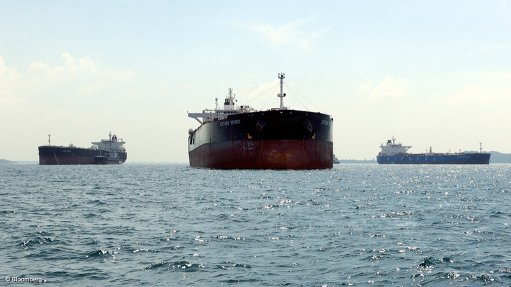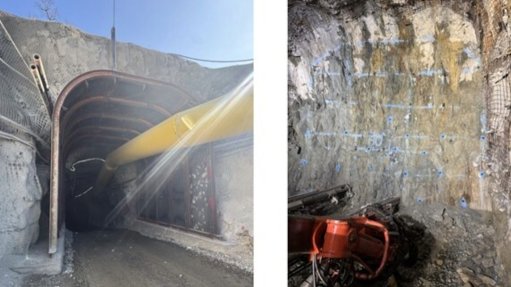Infrastructure rehabilitation, more exploration crucial for South African mining industry growth, Mthenjane says
Minerals Council South Africa CEO Mzila Mthenjane believes that growing the South African mining industry depends on restoring mining capacity through infrastructure rehabilitation in the short term and increasing exploration in the medium to long term.
Speaking at the Joburg Indaba on October 2, he emphasised that, while the industry had planned for growth, its potential had been limited by infrastructural deficiencies.
"We are an industry that has spent a significant amount of capital, planning for increasing capacity, but was disappointed by infrastructure. As infrastructure performance improves, we'll see the expansion of the industry," he said.
Mthenjane also stressed that future growth depended on exploration, noting that "exploration, exploration, exploration" was key to the industry’s medium- and long-term success.
He pointed out that while the mining industry had shifted from deep-level gold and platinum operations to bulk mining in areas such as the Northern Cape – particularly for iron-ore, manganese and chrome – growth had been hindered by challenges in logistics and electricity.
"We've missed out on a couple of booms because of [inadequate] infrastructure, particularly logistics and electricity," he explained.
Mthenjane also discussed the sector's reliance on Transnet Freight Rail (TFR) and the disruptions caused by power supply interruptions in the past. He said that, with 50% of mineral production transported by TFR and 40% of production in sectors such as platinum group metals (PGMs) and gold dependent on stable electricity supply, the impact of these issues had been profound.
Looking ahead, Mthenjane expressed optimism about South Africa's potential in critical minerals, particularly those needed for a low-carbon future.
He cited copper and rare earth minerals as key areas for exploration, emphasising that these minerals were vital not only for the energy transition but also for future technological development.
“We're in an industry where the world needs our products and South Africa is well endowed with mineral resources. These two intersect at the right point in time,” he said.
Afrimat CEO Andries van Heerden added that junior mining was also crucial for growing the South African mining industry.
“We mustn't underestimate the potential of junior mining in South Africa. If we think of all the mineral deposits around the country, be it iron-ore or manganese, many are too small for the majors to really justify the mega investments.
“That's where a small company can come in. That's a space that creates a lot of jobs. The jobs per ton of product being produced out of a small mine are significantly higher than that of the bigger mines,” he remarked.
Van Heerden said the junior mining industry had been undervalued and that the grassroots practicality and good intent of junior operations was often undermined by overzealous regulation.
“[I must] emphasise how important is it is for the regulatory authorities to assist, rather than to become an obstacle. I'm not saying we want shortcuts. We are absolutely committed to a well-run, safe operation that's compliant. However, closing a mine for [minor issues] is just ridiculous, and that happens all the time,” he said.
Mthejane further highlighted the need for human capital development, stating that: “We have to give a lot more focus to that, and I believe that's where the advantage will come for South Africa for beneficiation."
Impala Platinum CEO Nico Muller agreed but noted that crime and corruption were standing in the way of attracting and retaining the necessary skills and investment.
We have to start with crime and corruption. We have to stop that. We have to become a country that people want to come and live in. We have to attract skills from an industry point of view,” he said.
Muller added that creating an exploration-friendly jurisdiction was essential to enabling junior minors.
“I think most important is to create an exploration-friendly jurisdiction. The first thing is we have to simplify and reduce the cost of listing for junior miners. We've had some great work being done at the JSE to facilitate that in recent years. We have to create investor protection to attract venture capital.
“We have to have the right tax incentives. I think that we have the potential to attract if we create the right environment. There are 1 600 junior miners listed on the TSX. There are 600 on the ASX. We've got less than 20, and with our endowment, that is inexcusable,” he said.
However, despite these challenges, Minerals Council president Dr Nombasa Tsengwa said it was important to dispel the notion that the South African mining industry was on its way out.
“Despite the negative sentiment, it is an opportune time to displace perceptions about mining in South Africa being a sunset industry with data-driven caveats.
"As far as growth is concerned and employment, supported by diverse natural endowment of minerals, differentiated by its richness in PGMs, gold, iron-ore and manganese, the sector remains important in the economy, contributing about 8% to the GDP and providing direct employment to roughly 470 000 people,” she said.
She said that continued growth of the mining industry was important not only to benefit private companies but also the communities in which they operated.
“A survey of 12 of our members showed that they spent R2.3-billion on socioeconomic development. The expenditure focused largely on education and health. In addition, the companies surveyed spent R5.1-billion on training and development in a single financial year with an estimated value of between R13 500 and R21 700 per full-time employee across the various sectors,” she said.
Tsengwa added that communities were also beneficiaries of community benefit schemes, which derived revenue through dividend income from equity investments in mining companies.
“Despite constrained capacity to create more value, the mining industry has had a broad-based and positive impact on the economy, broader society, its employees and mine-host communities. We have a rare opportunity . . . with our Government of National Unity and the positive spirit it engendered when it was formed. We cannot afford to squander this chance to revitalise our economy and uplift our people to dignified livelihoods,” she said.
Article Enquiry
Email Article
Save Article
Feedback
To advertise email advertising@creamermedia.co.za or click here
Press Office
Announcements
What's On
Subscribe to improve your user experience...
Option 1 (equivalent of R125 a month):
Receive a weekly copy of Creamer Media's Engineering News & Mining Weekly magazine
(print copy for those in South Africa and e-magazine for those outside of South Africa)
Receive daily email newsletters
Access to full search results
Access archive of magazine back copies
Access to Projects in Progress
Access to ONE Research Report of your choice in PDF format
Option 2 (equivalent of R375 a month):
All benefits from Option 1
PLUS
Access to Creamer Media's Research Channel Africa for ALL Research Reports, in PDF format, on various industrial and mining sectors
including Electricity; Water; Energy Transition; Hydrogen; Roads, Rail and Ports; Coal; Gold; Platinum; Battery Metals; etc.
Already a subscriber?
Forgotten your password?
Receive weekly copy of Creamer Media's Engineering News & Mining Weekly magazine (print copy for those in South Africa and e-magazine for those outside of South Africa)
➕
Recieve daily email newsletters
➕
Access to full search results
➕
Access archive of magazine back copies
➕
Access to Projects in Progress
➕
Access to ONE Research Report of your choice in PDF format
RESEARCH CHANNEL AFRICA
R4500 (equivalent of R375 a month)
SUBSCRIBEAll benefits from Option 1
➕
Access to Creamer Media's Research Channel Africa for ALL Research Reports on various industrial and mining sectors, in PDF format, including on:
Electricity
➕
Water
➕
Energy Transition
➕
Hydrogen
➕
Roads, Rail and Ports
➕
Coal
➕
Gold
➕
Platinum
➕
Battery Metals
➕
etc.
Receive all benefits from Option 1 or Option 2 delivered to numerous people at your company
➕
Multiple User names and Passwords for simultaneous log-ins
➕
Intranet integration access to all in your organisation





















